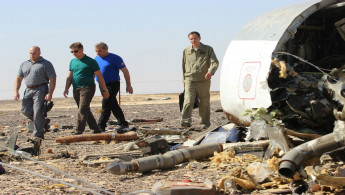Islamic State behind Russia plane crash: Britain
British and US officials said on Wednesday that they have information suggesting a bomb may have brought down the Russian jetliner that crashed in the Egyptian desert, while Britain said it was suspending flights to and from the Sinai Peninsula as a precaution.
Intercepted communications played a role in the tentative conclusion that the Islamic State group's (IS) Sinai affiliate planted an explosive device on the plane, said a US official briefed on the matter who spoke on condition of anonymity.
The official and others said there had been no formal judgment rendered by the CIA or other intelligence agencies, and that forensic evidence from the blast site, including the airplane's black box, was still being analysed.
The official added that intelligence analysts do not believe the operation was ordered by IS leaders in Raqqa, Syria. Rather, they believe that if it was a bomb, it was planned and executed by the IS affiliate in the Sinai, which operates autonomously.
Other officials cautioned that intercepted communications can sometimes be misleading and that it is possible the evidence will add up to a conclusion that there was no bomb.
Meanwhile, Russian and Egyptian investigators said Wednesday that the cockpit voice recorder of the Metrojet Airbus 321-200 had suffered substantial damage in the weekend crash that killed 224 people.
Information from the flight data recorder has been successfully copied and handed over to investigators.
Flights suspended
British Prime Minister David Cameron's office said British aviation experts were headed to the Red Sea resort of Sharm al-Sheikh, where the flight originated, to assess security before British flights there would be allowed to resume.
No British flights were flying to the resort Wednesday, but several were scheduled to depart.
Cameron's office said in a statement that it could not say "categorically" why the Russian jet had crashed.
"But as more information has come to light, we have become concerned that the plane may well have been brought down by an explosive device," it said.
The Prime Minister's office said Cameron had discussed the issue of security at the Sharm al-Sheikh airport with Egyptian President Abdel Fattah al-Sisi, who flew to Britain on Wednesday for an official visit.
The British disclosures would be an embarrassment to Sisi, who had insisted in an interview with the BBC on Tuesday that the security situation in the Sinai Peninsula is under "full control" because he has staked his legitimacy on restoring stability and reviving Egypt's economy.
The suspension of flights would be a further blow to Egypt's troubled tourism industry, which has suffered in the unrest that followed the 2011 Egyptian revolution and the subsequent coup.
British Transport Secretary Patrick McLoughlin said the British experts would "ensure the right security measures are in place for flights."
"It is when that review is completed that we will allow the flights that are there tonight to depart," he said.
The Irish Aviation Authority followed the British lead and directed Irish airlines to suspend flights to Sharm al-Sheikh Airport and into the airspace of the Sinai Peninsula "until further notice."
'Hurting tourism'
However, deputy head of Sharm al-Sheikh's Airport, Hany Ramsay said the British acted "too soon".
"Other countries might soon follow them," Ramsay told The Associated Press, suggesting there may be political and commercial motives behind the British statement.
"They want to hurt tourism and cause confusion," he added.
Several airlines, including Lufthansa and Air France, stopped flying over Sinai after the crash, but British carriers had kept to their schedules.
Almost 1 million Britons visit Egypt each year, many to Sharm al-Sheikh, which is also popular with Russians.
The Metrojet flight carrying mostly Russian vacationers from Sharm al-Sheikh to St. Petersburg broke up in the air at an altitude of 31,000 feet 23 minutes after takeoff and came down in the Sinai desert, Russian officials said.
The plane crash site, 70 kilometers (44 miles) south of the city of el-Arish, lies in the northern Sinai, where Egyptian security forces have battled local militants for years.
The IS group claimed it had downed the plane because of Moscow's recent military intervention in Syria against the extremist group, but Sisi dismissed that as "propaganda" aimed at damaging Egypt's image.
Douglas Barrie, military aerospace expert with the International Institute for Strategic Studies in London, said it was too soon to say for sure the cause of the crash but the "general suspicion" that an explosive device was involved has been mounting.
He said the British government's decision made sense.





 Follow the Middle East's top stories in English at The New Arab on Google News
Follow the Middle East's top stories in English at The New Arab on Google News

![Israeli forces ordered bombed Gaza's Jabalia, ordering residents to leave [Getty]](/sites/default/files/styles/image_330x185/public/2176418030.jpeg?h=a5f2f23a&itok=_YGZaP1z)
